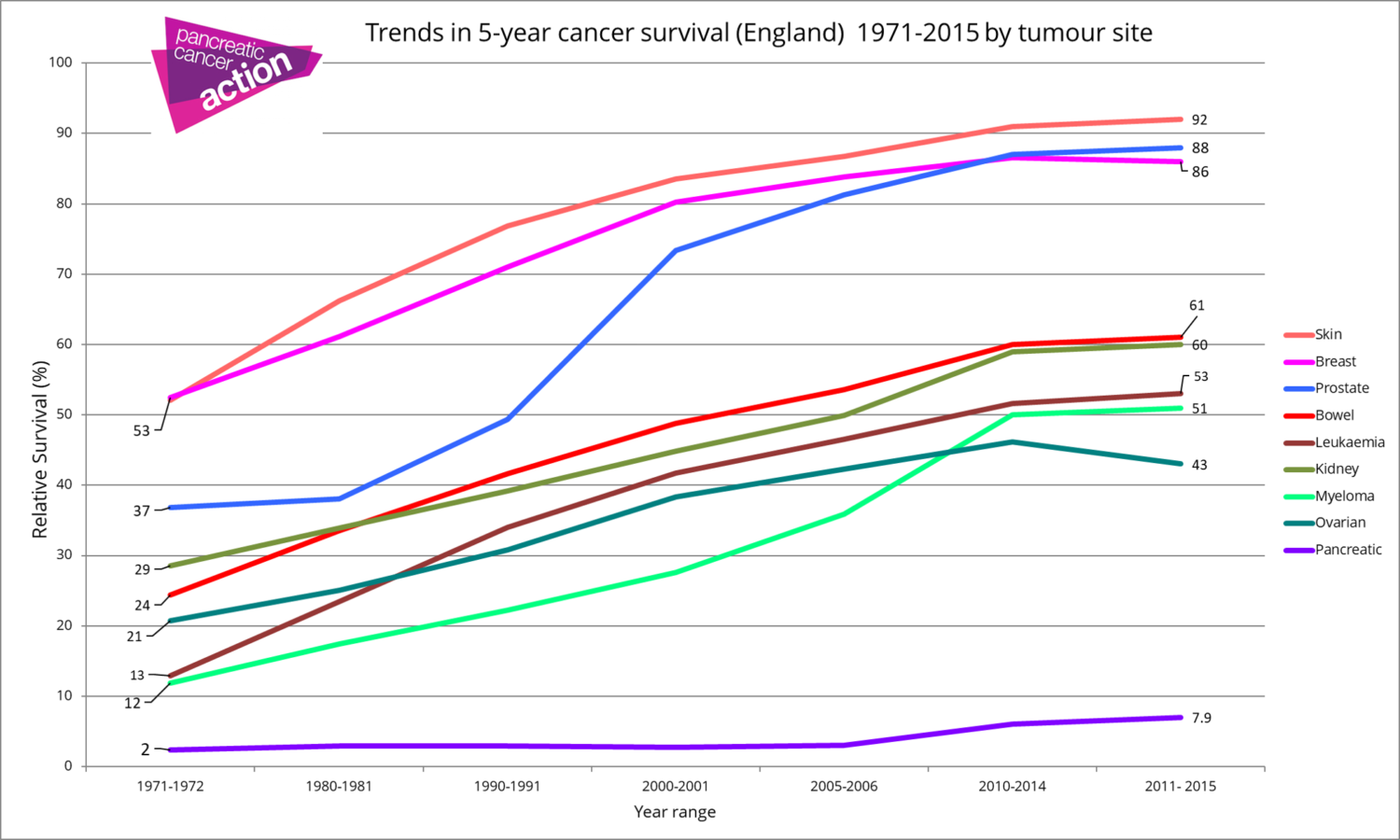Pancreatic cancer survival rates now almost 8%
New statistics published by the Lancet Oncology show the 5-year survival rate for pancreatic cancer to have risen to a record high, 7.9%, in the UK.*
Though it may seem small, this is great news for pancreatic cancer. After almost five decades without a meaningful increase in survival, we are beginning to see a slow but positive trend upwards. 10 years ago, when Pancreatic Cancer Action was founded, survival was around 3% and had not increased in years. This study shows that we are beginning to make inroads into the disease, so more people can survive for longer.
Why have survival rates increased?
Increases in pancreatic cancer survival are mirrored by increases in survival from other cancer types. There has been no one single reason for this. It is likely that improving surgical procedures, chemotherapies and other treatments have helped boost survival.
The key to pancreatic cancer survival is early diagnosis, and work to raise awareness of the disease amongst the public and health professionals so more people are diagnosed earlier, through their GP, may be helping this increase.
Though this research shows that pancreatic cancer survival is improving in the UK, we still lag behind other high-income countries. 5- year pancreatic cancer survival in Australia is almost 15% proving that improvements can be made now that will have an immediate effect on patients. The UK has far fewer diagnostic scanners like CTs compared to countries like Australia. Cancer waiting targets are failing to be met and staff vacancies continue to put strain on services. Pancreatic Cancer Action has highlighted these problems before and will continue to do so.
Furthermore, pancreatic cancer survival still lags far behind the other cancers included in the study. It has the worst survival rate of any common cancer and compares with 97%, 85%, and 66% survival for testicular, breast and cervical cancers respectively. **

Becky Rice, Health and Policy manager at Pancreatic Cancer Action, says:
“We must continue to raise awareness of the disease, push for pancreatic cancer specific policies to improve survival and keep the disease high on the agendas of researchers and policy makers.
There are reasons to be positive about further improving the survival of pancreatic cancer. The planned introduction of rapid diagnostic centres and continued research into screening and early diagnosis could hold exciting developments for survival and we will continue to evaluate their results.”
Pancreatic Cancer Action focuses on early diagnosis in everything we do. We help raise awareness throughout the UK and provide learning tools for GPs, pharmacists and hospital doctors. We help give patients and medical professionals, the knowledge and confidence they need for the earliest possible diagnosis and the best possible chance of survival.
The charity also announced last week their intention to merge with Pancreatic Cancer Scotland to make a bigger impact and to make 2020 the decade of change for the disease.
Notes
*The new survival rate was calculated using diagnosis and survival data from England, Wales, Scotland and Northern Ireland. The figures gathered were the most recent available, up to the end of the year 2015. Many places publish survival rates for pancreatic cancer, and it can be difficult to tell what is right. This data used in this Lancet study is taken directly from those sources where cancer data is reported, the Office of National Statistics, ISD/National Records of Scotland and the General Registrar’s Office of Northern Ireland so we can ensure that our stats are as accurate as possible. Organisations may report data on diagnosis, staging, treatments and survival differently.
**This is largely due to late diagnosis of the disease. One reason for this is that the symptoms are not well known by patients and doctors alike and its symptoms are easily confused with other less serious ailments (upset tummies, back pain, etc.). Many people who are diagnosed visit doctors repeatedly with symptoms, in some cases for years.
As well an extreme lack of awareness (76% of the UK cannot name one symptom of the disease) there is a serious lack of funding and treatment options for pancreatic cancer. Pancreatic cancer currently receives less than 3% of government funding, even though it is soon to overtake breast cancer as the 4th biggest cancer killer in the UK.